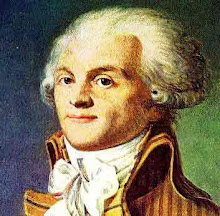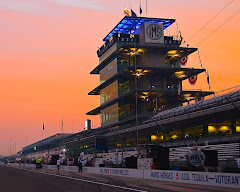Let us examine some specific points of criticism and assess their relative validity. Some of Wicker Bill's insights are better than others; is this not true for us all?
"Indy Idea blogger Roggespierre - I'm sure this is some sort of cleverWicker Bill is apparently not alone in that regard.
pun about the 18th century French master of the guillotine Maximilien
Robespierre, but I don't get it..." - Wicker Bill
Therefore, why Roggespierre?
1. Because heads have been rolling at the IMS and IRL administrative offices this year.
2. Because factional rivalry has thrown IndyCar racing into a state of perpetual and destructive revolution that has produced many economic carcasses and no market winners.
3. Because citizens tend to want the heads of IndyCar leadership without having a viable alternative at the ready.
4. Because I like the way it sounds.
"Roggespierre is clearly someone who wants most or all IndyCar races to be
run on ovals and allows this bias to influence his rhetoric." - Wicker
Bill
Wicker Bill's conclusion is correct. I do want most IndyCar races to be on ovals. I believe that the market for oval racing in the United States is much greater than the market for road and street racing. I want IndyCar to offer a racing product that the mainstream U.S. market will accept. I focus on the U.S. market because the Indianapolis 500 remains, at least to some degree, an iconic institution in its home nation.
I believe that a majority of racing spectators in the United States will not embrace an international, road racing product, no matter how outstanding that product might seem to those who like it.
I happen to enjoy sports car racing more than NASCAR racing. I thought that CART's North American Touring Car Series was outstanding. I was sorry to see it go. However, I also recognize that I am not at all representative of U.S. motorsports consumers at large in that regard. I believe that adults do well when they are honest with themselves.
"The blog entry begins by calling (Mike) King “a company man,” suggesting that his
statement that the attendance at Chicagoland, Kansas and Kentucky was poor this
year, and the attendance at St. Petersburg, Long Beach, Edmonton and Mid-Ohio
was good is because IndyCar told him too." - Wicker Bill
I respectfully request that Wicker Bill examine Mike King's public statements of seven or eight years ago. Compare them with his statements today. Then, explain where I got it wrong.
Wicker Bill commits a factual error that is fully confirmed by the record. I did not suggest that King challenged Pistone because "IndyCar told him to." I also do not believe this to be true.
Nobody has to tell Mike King what to say about IndyCar racing. He works there. King is fully incentivized to defend and support his bosses whenever he chooses to comment publicly. Therefore, my suggestion, in effect, was that Mike King is not a self-immolating moron. Why this is an object of controversy is beyond comprehension.
"Why would IndyCar, using King as a proxy, want to discredit three tracks
at which it will be racing at for the foreseeable future? Hell, Hulman & Co.
owns half of Chicagoland." - Wicker Bill
That is an outstanding and insightful question, one for which I have no answer. Perhaps Wicker Bill should ask Mike King. Perhaps I should, too. In this case, King's proclamations seem misaligned with the interests of both himself and his firm. I credit Wicker Bill for shining the light on this one.
Incidentally, Hulman & Co does not own half of Chicagoland. International Speedway Corporation purchased Raceway Associates (IMS was a partner) in 2007. I do ask that, if you must criticize, then kindly have the facts in order.
We shall continue this dialogue soon enough.
Roggespierre


America is a oval racing country. Simple as that. Continuing to try and be a road racing bred series (from the cars to the drivers to the owners to the rules) in a oval country, is beyond stupid. Especially, when you are tied to the Indy 500, which happens to be the biggest oval in the country.
ReplyDeleteThis sport will never become relevent again until it gets back to its original roots (which road racing played a very, very small % of) and quit trying to reincarnate CART. CART was never as "popular" as some of the fanboys would like you to believe. It was under CART's "leadership", that NASCAR took off and left Indy Cars in the dust. That would have happened, whether there ever was a IRL or a "split".
Because Tony Stewart, Jeff Gordon, Dale Earnhardt Jr and Kyle Busch sell in this country. Ryan Briscoe, Tony Kanaan, Dario Franchitti and Vitor Meira do not and never will.
Mr. Dickle,
ReplyDeleteGo back and read my three-part IndyCar Glory Days series. You will find that I agree with you. CART's greatest success was in the field of financial engineering. How else to explain its failure to land a revenue-generating television contract despite its Who's Who list of Fortune 500 "sponsors".
So, now, we have quite a mess. Remember that at least half of the teams are financed by international road racers who happen to drive the cars. Safe to say that those financiers probably do not fancy replacing themselves behind the wheel so that the series may prosper.
This is just one example of the many vested interests that routinely pick at the IndyCar carcass.
IRL management is stupid and feeble. In other words, it is exactly what many of the participants want.
Thank you for your insights. They are valued here.
Roggespierre
It's a shame that it's true. But there's really no getting around the fact that Americans are xenophobes who want to see Americans win everything, all the time. Hell, the traditional Indy 500 fan of the past was suspicious of drivers from strange places like Cally-forny.
ReplyDeleteFor three brief periods (the 1910's, the 1960's, and the mid-80's to 1995), the Indy 500 was a true world class event, attracting much of the best racing had to offer. But really, it's more *popular* the more provincial it is. Makes sense--America in general is provincial, and Indiana more so than most of the country.
I do wonder, for the blogger's ideas to really happen, it pretty much requires the teams to fire their talented foreign drivers and replace them with mediocre American hacks.